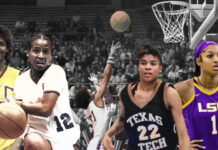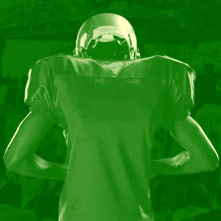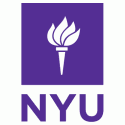 New data on graduation rates from the U.S. Department of Education shows that at the nation’s largest universities that participate in the National Collegiate Athletic Association’s Division I, the Black student graduation rate (for all students, not just athletes) in 2013 is 44 percent. The graduation rate is defined as all students entering a particular institution who graduate from that same institution with six years. For Whites the graduation rate is 22 points higher at 66 percent. This roughly 20-percentage-point racial gap in college graduation rates has persisted for more than the past two decades.
New data on graduation rates from the U.S. Department of Education shows that at the nation’s largest universities that participate in the National Collegiate Athletic Association’s Division I, the Black student graduation rate (for all students, not just athletes) in 2013 is 44 percent. The graduation rate is defined as all students entering a particular institution who graduate from that same institution with six years. For Whites the graduation rate is 22 points higher at 66 percent. This roughly 20-percentage-point racial gap in college graduation rates has persisted for more than the past two decades.
When we break the figures down by gender, we see that Black men have a college graduation rate of 39 percent, whereas the rate for Black women is 48 percent. Since 2009, there has been a slight reduction in the gender gap in Black student graduation rates from 12 percentage points to nine percentage points. The rate for Black women has declined while the rate for Black men has increased slightly.
For men the racial gap between Blacks and Whites is 25 percentage points. For women, the racial gap is 20 percentage points.












This article regarding low graduation rates among black students (both student athletes and non-athletes) brings up some persistent challenges that Division I schools confront. Having been a Faculty Athletic Representative for a Division I institution, I know first hand the issues involved with student athletes as well as their coaches. Practices, competition, and other obstacles for student-athletes can be overcome given the right administrative push. If students are given a clear message that they are students first, and athletes second, policies, programs, and personnel will provide an educational experience that will assist them in graduating versus just staying on campus until their eligibility expires. Mixed messages in this regard are the real problem in that everyone is not on the same page as to student-athlete welfare.
In the case of the general student population, the issues surprisingly are similar but different in that student-athletes live a sequestered life, especially when they are in season for their particular sport. Students who are not athletes have to navigate their educational experience with or without the assistance of faculty, staff, and administrators. Questions that need to be asked from both points of view by each campus include the following: 1) What policies and programs are in place that indicate that the institution is truly committed to student success? 2) Do faculty communicate clearly regarding their availability during office hours and are they utilized by students who truly need outside help and if not, why not? 3) Does the institution have special programs and services that are committed to improving retention and graduation rates among those identified populations that have been identified as having lower student success levels? 4) Does the Athletic Director and other athletic staff members provide input to their FAR (Faculty Athletics Representative) regarding the needs of student athletes that would ensure higher retention and graduation rates, especially among those groups of students who may be lagging behind their counterparts?
These are just a few of the many questions that need to be posed and answered to get to the bottom of the student success challenge that appears to be chronic within Division I institutions.